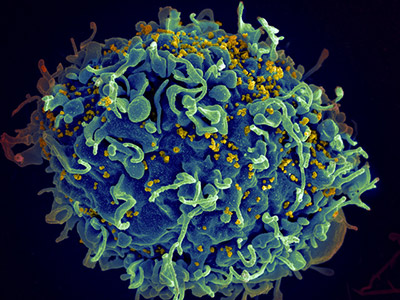Scientists discover powerful new anti-HIV agent that could be used for vaccine

HIV particles infecting a human T cell. (Image: NIH)
In a remarkable new advance against the virus that causes AIDS, scientists from America’s The Scripps Research Institute (TSRI) have announced the creation of a novel drug candidate that is so potent and universally effective, it might be used as a new kind of vaccine.
The research shows that the new engineered protein blocks every strain of HIV-1, HIV-2 and SIV (simian immunodeficiency virus) that has been isolated from humans or rhesus monkeys, including the hardest-to-stop variants.
It also protects against much-higher doses of virus than occur in most human transmission and does so for at least eight months after injection.
“Our compound is the broadest and most potent entry inhibitor described so far,” said Michael Farzan, a professor on TSRI’s Florida campus who led the effort. “Unlike antibodies, which fail to neutralize a large fraction of HIV-1 strains, our protein has been effective against all strains tested, raising the possibility it could offer an effective HIV vaccine alternative.”
When HIV infects a cell, it targets the CD4 lymphocyte, an integral part of the body’s immune system. HIV fuses with the cell and inserts its own genetic material and transforms the host cell into a HIV manufacturing site.
The new protein developed by the scientists binds to two sites on the surface of the virus simultaneously, preventing entry of HIV into the host cell. This helps to overcome the fact that HIV mutates and changes so easily.
“When antibodies try to mimic the receptor, they touch a lot of other parts of the viral envelope that HIV can change with ease,” said TSRI Research Associate Matthew Gardner, the first author of the study with Lisa M. Kattenhorn of Harvard Medical School. “We’ve developed a direct mimic of the receptors without providing many avenues that the virus can use to escape, so we catch every virus thus far.”
The protein is delivered in an engineered adeno-associated virus, a small, relatively innocuous virus that causes no disease.
Once injected into muscle tissue, the vehicle turns those cells into “factories” that could produce enough of the new protective protein to last for years, perhaps decades, Farzan said.
The research, which involved scientists from more than a dozen research institutions and both campuses of TSRI, was published online on February 18 ahead of print by the prestigious journal Nature.
Leave a Reply